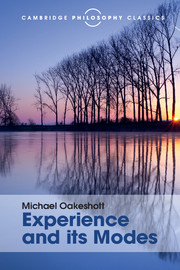5 - Practical experience
Published online by Cambridge University Press: 05 November 2015
Summary
Introduction
The worlds of history and of science, in spite of the testimonials to the completeness and perfection of their character with which they come before us, have turned out on examination to be abstract and defective. They are modes of experience which fall short of the totality of experience. And it is time now to consider the character of a world of ideas, different from these, which to many who have considered the matter has appeared to offer what these have failed to provide,—I mean the world of practical experience.
Writers are not wanting who conceive the totality of experience in terms either of history or of science; but those who thrust forward practice as the criterion of experience have at least the satisfaction of finding themselves in a majority. Indeed, when we consider the force of the temptation to reduce all experience to practical experience, to find in practical experience not merely the criterion of historical and scientific truth, but the criterion of all truth, it is not the prevalence of this belief which should surprise us, but the fact that it is not universal. This form of experience is (we may suppose) at once the most primitive and most general of all forms. And it is difficult to avoid the presumption that, if we embrace it, it will prove to be the world of concrete reality itself. The reduction of the whole of experience either to scientific experience or to historical experience has found general consent only upon rare occasions and in peculiar circumstances. But anyone who, at any time, comes forward with the suggestion that the world of practical experience is itself what is absolutely and finally satisfactory in experience; that it belongs to the character of thought to be for the sake of action, is assured in advance of the concurrence of the majority of mankind. Indeed, it is a common opinion that both history and science are modes of experience merely auxiliary to practice; they have been understood and explained as departments of the world of practical experience. History, we have seen, has been, and still is, almost wholly obscured by the confusion which exists with regard to its relationship with practical experience; and the emancipation of science from the despotism of practice is both slow and uncertain.
- Type
- Chapter
- Information
- Experience and its Modes , pp. 190 - 247Publisher: Cambridge University PressPrint publication year: 2015

